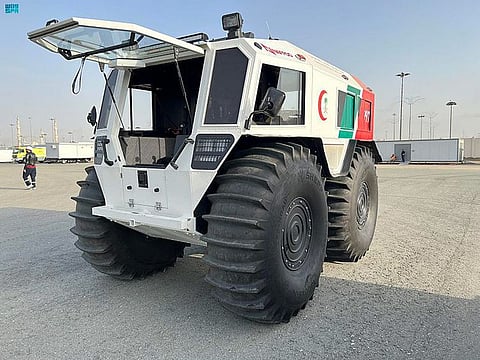Saudi Arabia: Amphibious ambulance debuts in Hajj
It can transport two patients and six others non-stop for nearly 19 hours and in the dark

Cairo: An amphibious ambulance capable of operating on a tough terrain was unveiled in the current Hajj pilgrimage season in Saudi Arabia as part of maximised services offered to pilgrims.
The ambulance, named Tamiyah, was launched by the Saudi Red Crescent as the first of its kind in the Middle East, according to the Saudi news agency SPA.
The ambulance can reach inhospitable areas that the ordinary ambulances are hard to access such as marshlands and mountainous sites.
The vehicle functions to undertake rescue and evacuation missions as well as to offer ambulatory services at the holy sites during this year’s Hajj attended by around 2 million Muslims from across the globe.
Among features of Tamiyah is the capability of controlling air pressure in its tyres to help overcome terrain obstacles and erratic weather conditions.
The armoured ambulance can transport two patients and six other persons plus the driver.
Moreover, it can operate non-stop for nearly 19 hours and in the dark.
The sophisticated vehicle is named after Jabal Tamiyah, a hill located between regions of Al Qassim and Medina.
Saudi Arabia, home to Islam’s two holiest sites, has put its Hajj-related agencies on maximum alert to ensure comfort for the large numbers of pilgrims.
Saudi Arabia has lifted limits on the numbers and ages of pilgrims for this year’s Hajj, reversing earlier restrictions prompted by COVID-19.
A total of 172 healthcare facilities in Saudi Arabia’s holy sites have been put in place to serve pilgrims this year.
The Saudi Ministry of Health has said that 32 hospitals supported by 140 health centres are allocated to provide services for pilgrims.
The facilities have a total bed capacity of around 6,132 including 761 beds for intensive care and 222 others for treating sunstrokes.
The ministry said it continues for the second year in a row to offer the virtual hospital service after its success in last year’s Hajj season.
More virtual clinics have been introduced into the holy places this year, the ministry added, putting the total healthcare professionals mobilised for serving pilgrims at more than 32,000.



